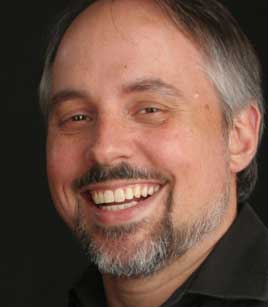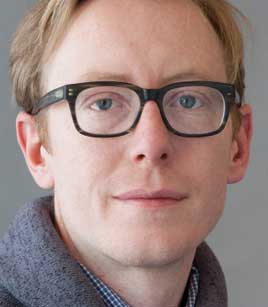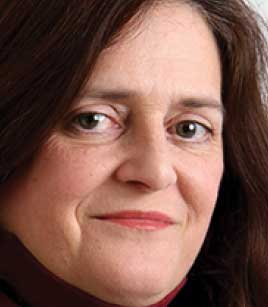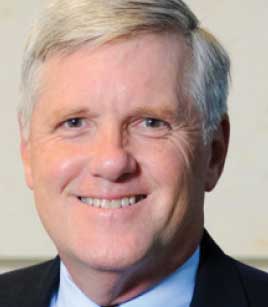
The Bill Lane Center for the American West, Stanford University
Watch complete video
2017 Knight-Risser Prize Symposium
Houston, You Have a Problem
A Disaster Foretold
At the symposium, the Texas Tribune’s Neena Satija and ProPublica’s Jeff Larson, members of the winning team, will be joined by a panel of journalists and policymakers for a conversation about investigative science journalism, storytelling through interactive simulations, and the outlook for vulnerable coastal communities in a time of climate change.
The event will be followed by a reception with light refreshments. Guests are asked to please RSVP using the form below.
Panel Discussion, Award Presentation and Q&A Session
Wednesday, Nov. 15, 2017
4:15-6:30pm
Paul Brest Hall West
555 Salvatierra Walk
Stanford University
(View map: Stanford | Google)
Panelists
Geoff McGhee, Moderator
Bill Lane Center for the American West
Stanford University
Neena Satija
Reporter, The Texas Tribune
Winner, 2017 Knight-Risser Prize
for “Hell and High Water”
Jeff Larson
Reporter, ProPublica
Winner, 2017 Knight-Risser Prize
for “Hell and High Water”
Cheryl Phillips
Lorry I. Lokey Visiting Professor in Professional Journalism
Stanford University
David J. Hayes
Distinguished Visiting Lecturer in Law
Stanford Law School
The discussion will be followed by a public reception. Please RSVP using the form below.
Logistics
Parking on campus is free after 4pm. View a map of walking directions from Wilbur Field Garage.
Panelist Biographies
Geoff McGhee, Moderator
@mcgeoff
 The creative director for media and communications for the Bill Lane Center for the American West at Stanford University, Geoff specializes in interactive data visualization and multimedia storytelling. He is a veteran of the multimedia and infographics staffs at The New York Times, Le Monde, and ABC News. Geoff spent a Knight Fellowship year at Stanford in 2009-2010 researching data visualization, which resulted in the widely-cited video documentary “Journalism in the Age of Data.” At the Bill Lane Center, Geoff is responsible for the Center’s websites and digital publications such as the ‘...& the West’ blog he co-produces with Felicity Barringer, and the EcoWest series of environmental data trackers on wildfires, drought, and snowpack, among others. Geoff has also worked on Center projects like Water in the West, a joint program with the Stanford Woods Institute for the Environment, and the Center’s Rural West Initiative, which conducted research and reporting on the alternative energy boom, as well as retracing a 100-year-old survey of country life originally commissioned by President Theodore Roosevelt. He also contributed a chapter on rural broadband internet issues to the Rural West Initiative’s 2015 book, Bridging the Distance: Common Issues of the Rural West. Geoff oversees the Center’s Western Enterprise Media Fellowships program, which brings journalists to the Center for brief collaborations and supports travel and research expenses for work on critical western issues.
The creative director for media and communications for the Bill Lane Center for the American West at Stanford University, Geoff specializes in interactive data visualization and multimedia storytelling. He is a veteran of the multimedia and infographics staffs at The New York Times, Le Monde, and ABC News. Geoff spent a Knight Fellowship year at Stanford in 2009-2010 researching data visualization, which resulted in the widely-cited video documentary “Journalism in the Age of Data.” At the Bill Lane Center, Geoff is responsible for the Center’s websites and digital publications such as the ‘...& the West’ blog he co-produces with Felicity Barringer, and the EcoWest series of environmental data trackers on wildfires, drought, and snowpack, among others. Geoff has also worked on Center projects like Water in the West, a joint program with the Stanford Woods Institute for the Environment, and the Center’s Rural West Initiative, which conducted research and reporting on the alternative energy boom, as well as retracing a 100-year-old survey of country life originally commissioned by President Theodore Roosevelt. He also contributed a chapter on rural broadband internet issues to the Rural West Initiative’s 2015 book, Bridging the Distance: Common Issues of the Rural West. Geoff oversees the Center’s Western Enterprise Media Fellowships program, which brings journalists to the Center for brief collaborations and supports travel and research expenses for work on critical western issues.
Neena Satija
@neenareports
 Neena Satija is an investigative reporter and radio producer for the Texas Tribune and Reveal, a public radio program from the Center for Investigative Reporting. Previously, she was the environment reporter at the Tribune. A native of the Washington, D.C. area, she graduated from Yale University in 2011, and then worked for the New Haven Independent, the Connecticut Mirror, and WNPR/Connecticut Public Radio. She has also been a regular contributor to National Public Radio. As an East Coast transplant she is particularly thrilled with Austin tacos and warm weather.
Neena Satija is an investigative reporter and radio producer for the Texas Tribune and Reveal, a public radio program from the Center for Investigative Reporting. Previously, she was the environment reporter at the Tribune. A native of the Washington, D.C. area, she graduated from Yale University in 2011, and then worked for the New Haven Independent, the Connecticut Mirror, and WNPR/Connecticut Public Radio. She has also been a regular contributor to National Public Radio. As an East Coast transplant she is particularly thrilled with Austin tacos and warm weather.
Jeff Larson
@thejefflarson
 Jeff Larson is a reporter at ProPublica. He is a winner of the Livingston Award for the 2011 series Redistricting: How Powerful Interests are Drawing You Out of a Vote.
Jeff Larson is a reporter at ProPublica. He is a winner of the Livingston Award for the 2011 series Redistricting: How Powerful Interests are Drawing You Out of a Vote.
Cheryl Phillips
@cephillips
 Cheryl Phillips has been teaching journalism at Stanford since 2014 and is a founding member of the Stanford Computational Journalism Lab. She is involved in a cross-departmental effort with Sharad Goel, an Assistant Professor at Stanford in the Department of Management Science & Engineering, to collect police interaction data and evaluate racial disparities. The effort, called the Stanford Open Policing Project, is then working to share that data with journalists and researchers. Cheryl also is a member of the California Civic Data Coalition, A collaboration among data journalists to open up California campaign finance data and make it more accessible. Previously, she worked at The Seattle Times for 12 years. Her most recent position in Seattle was as Data Innovation Editor. In that role, she analyzed data for stories, facilitated online storytelling and coordinated newsroom data journalism training. She also was the deputy investigations editor, an assistant metro editor and an investigative reporter at The Seattle Times. In 2014, she was involved in coverage of a landslide that killed 43 people and was particularly focused on collecting and using data to help cover the story. That coverage received a Pulitzer Prize for breaking news. In 2009, she was the lone editor in the newsroom when four police officers were shot at a coffee shop and was integrally involved in the subsequent coverage of the shooting and 30-hour manhunt for the suspect. That work by the newsroom received a Pulitzer Prize for breaking news. She also has twice been on teams that were Pulitzer finalists. She has worked at USA Today and at newspapers in Michigan, Montana and Texas. Cheryl has taught data journalism and data visualization at the University of Washington and Seattle University. She also served for 10 years on the board of directors for Investigative Reporters and Editors, a grass roots training organization for journalists and she is a former IRE board president. She currently serves on an advisory board for Tableau Public, a data visualization software tool. Twitter: @cephillips
Cheryl Phillips has been teaching journalism at Stanford since 2014 and is a founding member of the Stanford Computational Journalism Lab. She is involved in a cross-departmental effort with Sharad Goel, an Assistant Professor at Stanford in the Department of Management Science & Engineering, to collect police interaction data and evaluate racial disparities. The effort, called the Stanford Open Policing Project, is then working to share that data with journalists and researchers. Cheryl also is a member of the California Civic Data Coalition, A collaboration among data journalists to open up California campaign finance data and make it more accessible. Previously, she worked at The Seattle Times for 12 years. Her most recent position in Seattle was as Data Innovation Editor. In that role, she analyzed data for stories, facilitated online storytelling and coordinated newsroom data journalism training. She also was the deputy investigations editor, an assistant metro editor and an investigative reporter at The Seattle Times. In 2014, she was involved in coverage of a landslide that killed 43 people and was particularly focused on collecting and using data to help cover the story. That coverage received a Pulitzer Prize for breaking news. In 2009, she was the lone editor in the newsroom when four police officers were shot at a coffee shop and was integrally involved in the subsequent coverage of the shooting and 30-hour manhunt for the suspect. That work by the newsroom received a Pulitzer Prize for breaking news. She also has twice been on teams that were Pulitzer finalists. She has worked at USA Today and at newspapers in Michigan, Montana and Texas. Cheryl has taught data journalism and data visualization at the University of Washington and Seattle University. She also served for 10 years on the board of directors for Investigative Reporters and Editors, a grass roots training organization for journalists and she is a former IRE board president. She currently serves on an advisory board for Tableau Public, a data visualization software tool. Twitter: @cephillips
David J. Hayes
@djhayes01
 David J. Hayes is a Distinguished Visiting Lecturer in Law at the Stanford Law School where he has been teaching courses focused on renewable and conventional energy, wildlife trafficking, NEPA reform, natural resources, and climate change. Hayes also is the Executive Director of the State Energy & Environmental Impact Center at the NYU School of Law. He is a Consulting Professor at Stanford’s Woods Institute for the Environment, a Research Scholar at the Precourt Institute for Energy at Stanford, and a member of the Advisory Council for Stanford’s Lane Center for the American West, and Pacific Gas & Electric Company’s Sustainability Advisory Council. Prior to teaching at Stanford, Hayes served as the Deputy Secretary and Chief Operating Officer of the Department of the Interior for Presidents Clinton and Obama from 1999-2001 and 2009-2013, respectively. As the Senate-confirmed number two official at Interior, he had line authority over Interior’s 70,000 employees, $14 billion dollar budget, and the Department’s ten major bureaus and agencies. Hayes focused on energy, climate change, conservation and Indian issues during his two tours of duty at Interior. On the energy and climate change front, he was a key leader in facilitating the approval of more than 13,000 megawatts of renewable energy projects on public lands and offshore waters; he led the Interior Department’s Climate Change and Energy Task Force and developed a network of Climate Science Centers and Landscape Conservation Cooperatives to study and address climate change-related impacts on water, wildlife and coastal resources; and he served as point for Secretary Salazar in managing Interior’s response to the Deepwater Horizon oil spill crisis in the Gulf of Mexico, including reorganization of the Department’s offshore leasing, regulatory and enforcement functions. He received the U.S. Coast Guard’s highest civilian honor (the USCG’s Distinguished Public Service Award) for his leadership in addressing the Gulf oil spill.
David J. Hayes is a Distinguished Visiting Lecturer in Law at the Stanford Law School where he has been teaching courses focused on renewable and conventional energy, wildlife trafficking, NEPA reform, natural resources, and climate change. Hayes also is the Executive Director of the State Energy & Environmental Impact Center at the NYU School of Law. He is a Consulting Professor at Stanford’s Woods Institute for the Environment, a Research Scholar at the Precourt Institute for Energy at Stanford, and a member of the Advisory Council for Stanford’s Lane Center for the American West, and Pacific Gas & Electric Company’s Sustainability Advisory Council. Prior to teaching at Stanford, Hayes served as the Deputy Secretary and Chief Operating Officer of the Department of the Interior for Presidents Clinton and Obama from 1999-2001 and 2009-2013, respectively. As the Senate-confirmed number two official at Interior, he had line authority over Interior’s 70,000 employees, $14 billion dollar budget, and the Department’s ten major bureaus and agencies. Hayes focused on energy, climate change, conservation and Indian issues during his two tours of duty at Interior. On the energy and climate change front, he was a key leader in facilitating the approval of more than 13,000 megawatts of renewable energy projects on public lands and offshore waters; he led the Interior Department’s Climate Change and Energy Task Force and developed a network of Climate Science Centers and Landscape Conservation Cooperatives to study and address climate change-related impacts on water, wildlife and coastal resources; and he served as point for Secretary Salazar in managing Interior’s response to the Deepwater Horizon oil spill crisis in the Gulf of Mexico, including reorganization of the Department’s offshore leasing, regulatory and enforcement functions. He received the U.S. Coast Guard’s highest civilian honor (the USCG’s Distinguished Public Service Award) for his leadership in addressing the Gulf oil spill.
Texas Tribune, ProPublica

The Desert Sun and USA Today

CPI, InsideClimate News, The Weather Channel

The Seattle Times

The Sacramento Bee

High Country News

5280 Magazine

Seattle Post-Intelligencer

What Went Wrong?
The Seattle Times

San Antonio Express-News

The Los Angeles Times

High Country News



